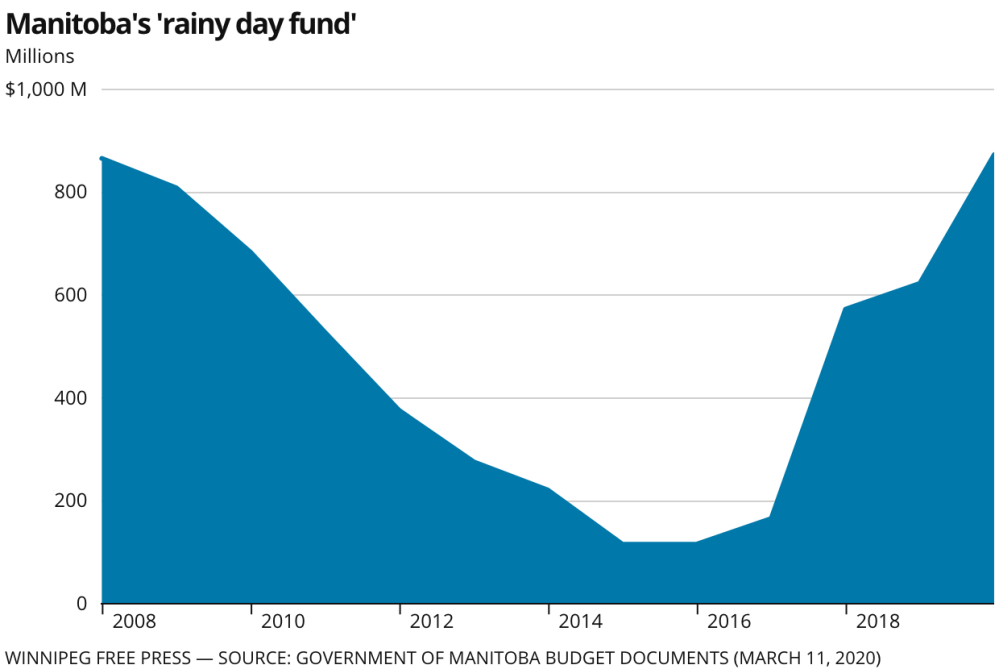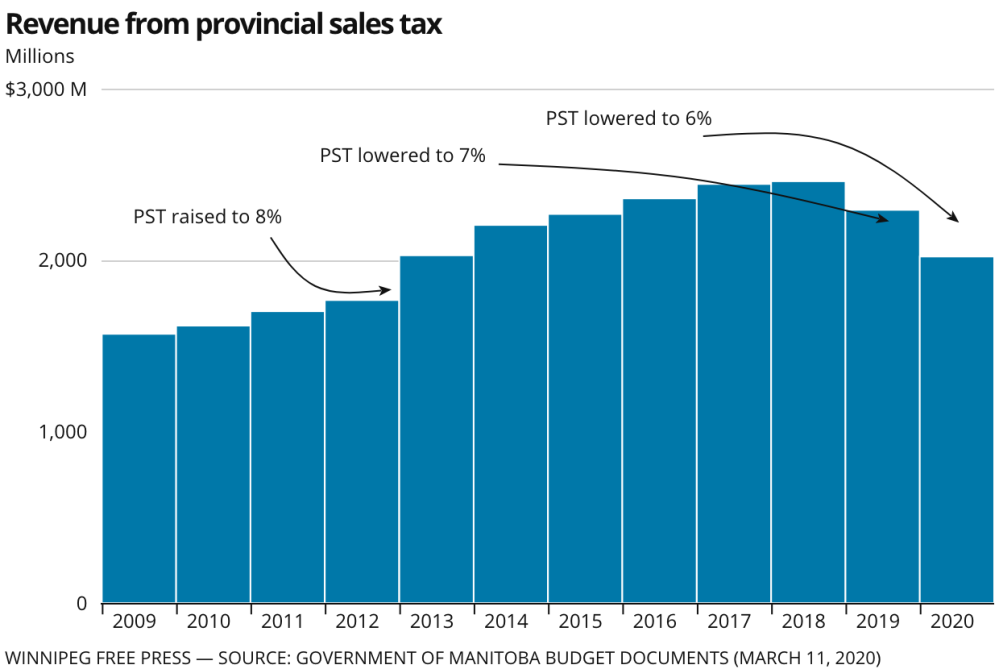PST cut crushed under financial weight of COVID-19
Read this article for free:
or
Already have an account? Log in here »
To continue reading, please subscribe:
Monthly Digital Subscription
$0 for the first 4 weeks*
- Enjoy unlimited reading on winnipegfreepress.com
- Read the E-Edition, our digital replica newspaper
- Access News Break, our award-winning app
- Play interactive puzzles
*No charge for 4 weeks then price increases to the regular rate of $19.00 plus GST every four weeks. Offer available to new and qualified returning subscribers only. Cancel any time.
Monthly Digital Subscription
$4.75/week*
- Enjoy unlimited reading on winnipegfreepress.com
- Read the E-Edition, our digital replica newspaper
- Access News Break, our award-winning app
- Play interactive puzzles
*Billed as $19 plus GST every four weeks. Cancel any time.
To continue reading, please subscribe:
Add Free Press access to your Brandon Sun subscription for only an additional
$1 for the first 4 weeks*
*Your next subscription payment will increase by $1.00 and you will be charged $16.99 plus GST for four weeks. After four weeks, your payment will increase to $23.99 plus GST every four weeks.
Read unlimited articles for free today:
or
Already have an account? Log in here »
Hey there, time traveller!
This article was published 26/03/2020 (2089 days ago), so information in it may no longer be current.
A week ago, Manitoba Premier Brian Pallister bragged his government would still deliver on a promised PST cut, and spoke confidently about its financial preparedness to withstand a pandemic.
Seven days later, the premier said the provincial sales tax would remain at its current level, a planned carbon tax would be deferred, and the province will need to borrow up to $5 billion to get through the next year.
The sudden reversal is indicative of the harsh economic consequences COVID-19 is having on governments of every level.
Pallister said Thursday the financial challenges “may be without precedent” in Manitoba.
“The gap between the revenues that were coming in and what’s coming in now is enormous, and the need to borrow additional money is enormous,” Pallister told a conference call with reporters.
He said the province’s rainy day fund — budgeted earlier this month to climb to $872 million this year — could be wiped out in three months or less.
“I’d say, at the very best, we have about three months of cushion” before having to borrow to pay the bills.
Pallister revealed the potential magnitude of the economic hit while calling on Ottawa to establish an emergency credit agency to borrow money on the provinces’ behalf.
The premier said such a move could save Manitoba at least a percentage point in interest costs because of the federal government’s better credit rating. Pallister said he planned to raise his idea during a conference call with his fellow first ministers later Thursday.
He said Manitoba would likely have to borrow $10 billion this year — although around half that would be needed to renew existing credit arrangements.
“Our numbers right now tell us that we’ll have approximately a $5-billion additional hit, on top of the renewed debt, that is coming our way this year,” the premier said.
He said the planned one-point PST cut, which had been slated for July 1, would be postponed, not cancelled.
Pallister said he was not planning to defer the tax cut or the proposed provincial carbon levy “beyond, at the latest, next year.”
The Progressive Conservative government was to have presented its budget March 11, but its release was delayed by more than a week because of Opposition NDP procedural delays in the legislature.
When Finance Minister Scott Fielding unveiled his financial blueprint March 19, it was accompanied by an 11-page addendum, adjusting economic growth forecasts and other financial predictions due to the potential impact of the novel coronavirus pandemic.
The updated budget still forecast economic growth of 0.6 per cent for the fiscal year beginning April 1. It said the pandemic could hurt government revenues by anywhere from $110 million to $482 million. It said increased health-care costs — over and above what was budgeted — could rise by between $50 million and $200 million.
Now, it appears those projections are also out of date.
The postponement of the PST reduction could jeopardize some parts the City of Winnipeg’s budget.
Council recently approved a four-year final budget that devotes $3.3 million of expected savings from the tax cut to a few key investments. The money was earmarked to help ensure six city libraries keep their Sunday hours, Leisure Guide programs see fewer cuts, new emergency preparedness staff are hired, and new investments are available for public art.
Winnipeg Mayor Brian Bowman was not available for comment Thursday.
In an email, a spokesperson from the mayor’s office said the change came without warning.
“The mayor learned of this in real-time via the premier’s press conference and will be seeking clarity from the province and then engaging the public service regarding next steps,” wrote spokesperson Jeremy Davis.
In addition to boosting its rainy day fund, the province also allocated extra money to an emergency expenditures contingency fund in its budget, bringing the total to $100 million.
Pallister said previously the government has also identified $500 million in planned expenditures that it can defer or redeploy if needed.
— with files from Joyanne Pursaga
larry.kusch@freepress.mb.ca

Our newsroom depends on a growing audience of readers to power our journalism. If you are not a paid reader, please consider becoming a subscriber.
Our newsroom depends on its audience of readers to power our journalism. Thank you for your support.
History
Updated on Thursday, March 26, 2020 7:45 PM CDT: Updates reference to city budget







